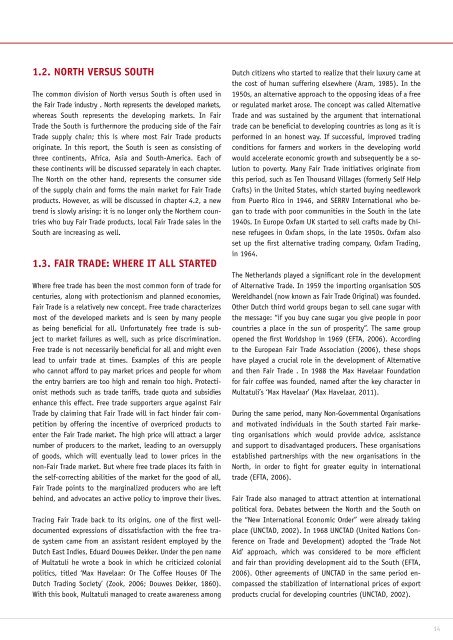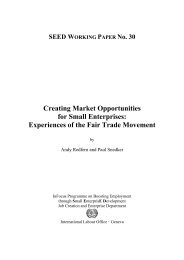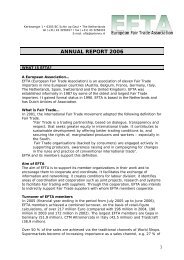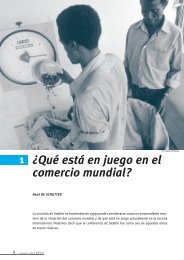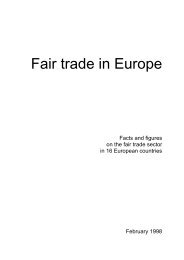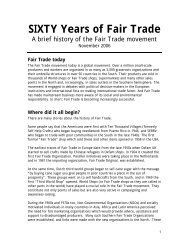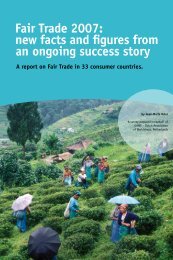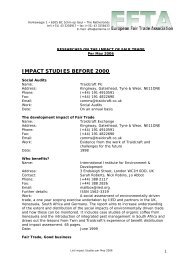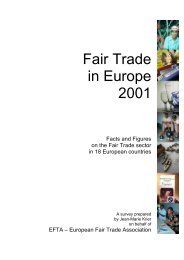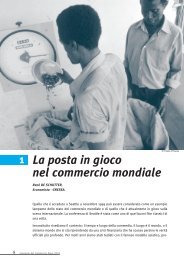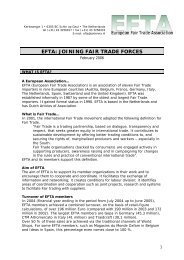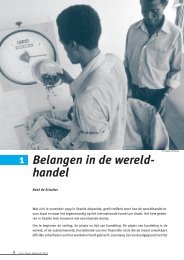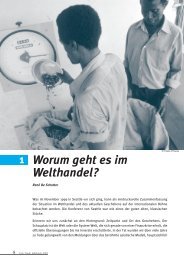2010 - European Fair Trade Association
2010 - European Fair Trade Association
2010 - European Fair Trade Association
Create successful ePaper yourself
Turn your PDF publications into a flip-book with our unique Google optimized e-Paper software.
1.2. North versus South<br />
The common division of North versus South is often used in<br />
the <strong>Fair</strong> <strong>Trade</strong> industry . North represents the developed markets,<br />
whereas South represents the developing markets. In <strong>Fair</strong><br />
<strong>Trade</strong> the South is furthermore the producing side of the <strong>Fair</strong><br />
<strong>Trade</strong> supply chain; this is where most <strong>Fair</strong> <strong>Trade</strong> products<br />
originate. In this report, the South is seen as consisting of<br />
three continents, Africa, Asia and South-America. Each of<br />
these continents will be discussed separately in each chapter.<br />
The North on the other hand, represents the consumer side<br />
of the supply chain and forms the main market for <strong>Fair</strong> <strong>Trade</strong><br />
products. However, as will be discussed in chapter 4.2, a new<br />
trend is slowly arising: it is no longer only the Northern countries<br />
who buy <strong>Fair</strong> <strong>Trade</strong> products, local <strong>Fair</strong> <strong>Trade</strong> sales in the<br />
South are increasing as well.<br />
1.3. <strong>Fair</strong> <strong>Trade</strong>: where it all started<br />
Where free trade has been the most common form of trade for<br />
centuries, along with protectionism and planned economies,<br />
<strong>Fair</strong> <strong>Trade</strong> is a relatively new concept. Free trade characterizes<br />
most of the developed markets and is seen by many people<br />
as being beneficial for all. Unfortunately free trade is subject<br />
to market failures as well, such as price discrimination.<br />
Free trade is not necessarily beneficial for all and might even<br />
lead to unfair trade at times. Examples of this are people<br />
who cannot afford to pay market prices and people for whom<br />
the entry barriers are too high and remain too high. Protectionist<br />
methods such as trade tariffs, trade quota and subsidies<br />
enhance this effect. Free trade supporters argue against <strong>Fair</strong><br />
<strong>Trade</strong> by claiming that <strong>Fair</strong> <strong>Trade</strong> will in fact hinder fair competition<br />
by offering the incentive of overpriced products to<br />
enter the <strong>Fair</strong> <strong>Trade</strong> market. The high price will attract a larger<br />
number of producers to the market, leading to an oversupply<br />
of goods, which will eventually lead to lower prices in the<br />
non-<strong>Fair</strong> <strong>Trade</strong> market. But where free trade places its faith in<br />
the self-correcting abilities of the market for the good of all,<br />
<strong>Fair</strong> <strong>Trade</strong> points to the marginalized producers who are left<br />
behind, and advocates an active policy to improve their lives.<br />
Tracing <strong>Fair</strong> <strong>Trade</strong> back to its origins, one of the first welldocumented<br />
expressions of dissatisfaction with the free trade<br />
system came from an assistant resident employed by the<br />
Dutch East Indies, Eduard Douwes Dekker. Under the pen name<br />
of Multatuli he wrote a book in which he criticized colonial<br />
politics, titled ‘Max Havelaar: Or The Coffee Houses Of The<br />
Dutch Trading Society’ (Zook, 2006; Douwes Dekker, 1860).<br />
With this book, Multatuli managed to create awareness among<br />
Dutch citizens who started to realize that their luxury came at<br />
the cost of human suffering elsewhere (Aram, 1985). In the<br />
1950s, an alternative approach to the opposing ideas of a free<br />
or regulated market arose. The concept was called Alternative<br />
<strong>Trade</strong> and was sustained by the argument that international<br />
trade can be beneficial to developing countries as long as it is<br />
performed in an honest way. If successful, improved trading<br />
conditions for farmers and workers in the developing world<br />
would accelerate economic growth and subsequently be a solution<br />
to poverty. Many <strong>Fair</strong> <strong>Trade</strong> initiatives originate from<br />
this period, such as Ten Thousand Villages (formerly Self Help<br />
Crafts) in the United States, which started buying needlework<br />
from Puerto Rico in 1946, and SERRV International who began<br />
to trade with poor communities in the South in the late<br />
1940s. In Europe Oxfam UK started to sell crafts made by Chinese<br />
refugees in Oxfam shops, in the late 1950s. Oxfam also<br />
set up the first alternative trading company, Oxfam Trading,<br />
in 1964.<br />
The Netherlands played a significant role in the development<br />
of Alternative <strong>Trade</strong>. In 1959 the importing organisation SOS<br />
Wereldhandel (now known as <strong>Fair</strong> <strong>Trade</strong> Original) was founded.<br />
Other Dutch third world groups began to sell cane sugar with<br />
the message: “if you buy cane sugar you give people in poor<br />
countries a place in the sun of prosperity”. The same group<br />
opened the first Worldshop in 1969 (EFTA, 2006). According<br />
to the <strong>European</strong> <strong>Fair</strong> <strong>Trade</strong> <strong>Association</strong> (2006), these shops<br />
have played a crucial role in the development of Alternative<br />
and then <strong>Fair</strong> <strong>Trade</strong> . In 1988 the Max Havelaar Foundation<br />
for fair coffee was founded, named after the key character in<br />
Multatuli’s ‘Max Havelaar’ (Max Havelaar, 2011).<br />
During the same period, many Non-Governmental Organisations<br />
and motivated individuals in the South started <strong>Fair</strong> marketing<br />
organisations which would provide advice, assistance<br />
and support to disadvantaged producers. These organisations<br />
established partnerships with the new organisations in the<br />
North, in order to fight for greater equity in international<br />
trade (EFTA, 2006).<br />
<strong>Fair</strong> <strong>Trade</strong> also managed to attract attention at international<br />
political fora. Debates between the North and the South on<br />
the “New International Economic Order” were already taking<br />
place (UNCTAD, 2002). In 1968 UNCTAD (United Nations Conference<br />
on <strong>Trade</strong> and Development) adopted the ‘<strong>Trade</strong> Not<br />
Aid’ approach, which was considered to be more efficient<br />
and fair than providing development aid to the South (EFTA,<br />
2006). Other agreements of UNCTAD in the same period encompassed<br />
the stabilization of international prices of export<br />
products crucial for developing countries (UNCTAD, 2002).<br />
14


